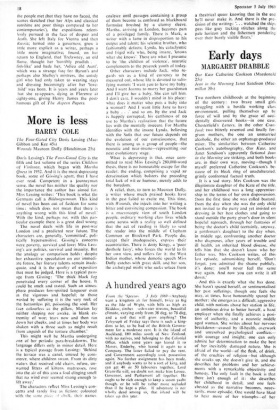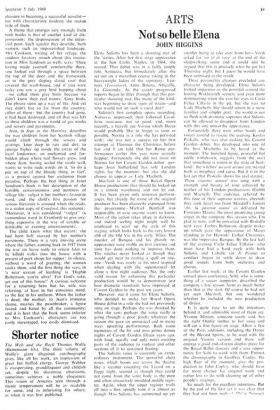Early days
MARGARET DRABBLE
Our Kate Catherine Cookson (Macdonald 25s) jean in the Morning Janet Sandison (Mac- millan 30s) Two northern childhoods at the beginning of the century: two brave small girls struggling with a hostile working class environment, pulling themselves up by force of will and by the grace of acci- dentally discovered books—in one case, Chesterfield's Letters, in the other Cran- ford; two bitterly resented and finally for- given mothers, the one an unmarried alcoholic, the other an orphanage-produced miser. The similarities between Catherine Cookson's autobiography, Our Kate, and Janet Sandison's apparently fictional Jean in the Morning are striking, and both books are, in their own way, moving—though I myself preferred Catherine Cookson's be- cause of its bleak ring of unadulterated, grimly confronted factual truth.
It is a sad story. Mrs Cookson was the illegitimate daughter of the Kate of the title, and her childhood was a long apprentice- ship in the terms of her own dispossession, from the first time she was called bastard. from the day when she was the only child not invited to the party and yet insisted on dressing in her best clothes and going to stand outside the party giver's door in silent hopeful reproach, through her fantasies of being the doctor's child (certainly, anyway, a gentleman's daughter) to the day when, in middle age, confronting another doctor who diagnoses, after years of trouble and ill health, an inherited blood disease, she tells him that she doesn't know who her father was. Mrs Cookson writes, of this last episode, admonishing herself, 'Don't forget, you admitted the shame publicly, it's done: you'll never feel the same way again. And now you can write it all down.'
,.And this is exactly what she has done. She hasn't spared herself, or sentimentalised her past sufferings, though one feels she may, at times, have honourably spared her mother: she emerges as a difficult, aggressive child, with notions above her station in life. an ambitious drive to better herself, a hard employer when she finally achieves a posi- tion of authority, and a neurotic middle aged woman. She writes about her nervous breakdown—caused by ill-health, overwork and unresolved psychological conflicts— with courage and insight; one can only admire her determination to make the best of her inevitably damaged nature. She is afraid of the world—of the flesh, of drink, of the cruelties of religion—but although she cracks up, she doesn't give in, and she describes her problems and her achieve- ments with a remarkable objectivity and honesty. The only fault in the book is that there isn't enough of it: she describes her childhood in detail, and one feels cheated as the narrative becomes, neces- sarily. more episodic. One would have liked to hear more of her triumphs—of her pleasure in becoming a successful novelist— but with characteristic modesty she makes little of them.
A theme that emerges very strongly from both books is that of another kind of dis- possession: the dispossession of the indus- trial poor. Such squalor they describe, both women, such an impoverished landscape. Mrs Cookson, writing of her refuge, the outdoor lavatory (much about this institu- tion in Miss Sandison as well), says: 'Once having made yourself comfortable there, you looked out through a space between the top of the door and the framework on to the grey sloping slated roof that covered the wash-house, and if you were lucky you saw a grey bird hopping about —we called them grey birds because we didn't know their real names.' Grey birds. The phrase sums up a way of life. And yet they didn't live so far from the country, either of them: but the country had gone, it had been destroyed, and all that was left to these children was a world of gas works and sewers and pavements.
Jean, in Jean in the Morning, describes the way children from her Scottish village would climb through the sewers and gratings, knee deep in rats and dirt, to emerge higher up inside the estate of the local landowner, an enchanted and for- bidden place where real flowers grew, and where Jean, having scaled the castle wall, wants to write rude words on it, 'to do a pee on top of the bloody thing, in fact', as a protest against her exclusion from paradise. Perhaps the best thing in Janet Sandison's book is her description of the horrible censoriousness and pettiness of village life: vulgar is her mother's favourite word, and the child's first passion for serious literature is aroused when she reads, in a stolen copy of Cranford, this sentence: 'Moreover, it was considered "vulgar" (a tremendous word in Cranford) to give any- thing expensive in the way of eatable or drinkable at evening entertainments'.
The child knew what that meant: she had been half starved by her mother's parsimony. There is a very moving scene where the father, coming back in 1917 from the war on leave (only to return later to be killed) walks into the house with a present of pork chops for supper: in silence, without a word of greeting, the woman cooks them, and the first thing she says, in 'a near scream of loathing' is 'Hughie Robertson, you're alive! For God's sake, get out of this house!' A curious welcome for a returning hero but his wife was referring, at least in her conscious mind, to the lice in his uniform. When the father is dead, the mother, to Jean's immense shame, marries the pawnbroker, a figure feared and hated by all the community; and it is here that the book seems inferior to Mrs Cookson's: characters are too easily stereotyped, too easily dismissed.



































 Previous page
Previous page